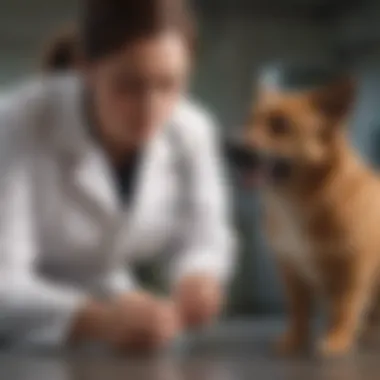Understanding Explosive Diarrhea in Dogs: Causes and Care


Intro
Explosive diarrhea in dogs is a significant issue that affects many pets and their owners. Understanding the condition is crucial for responsible pet care. This guide provides valuable insights into the various causes, symptoms, and management strategies associated with explosive diarrhea in canines. From dietary factors to potential infections, being informed can help dog owners make better decisions for their pets' health and well-being.
Understanding Your Pet
When addressing health issues like explosive diarrhea, it is also essential to understand your pet's unique characteristics. Each breed can have different predispositions to gastrointestinal disturbances.
Breed Traits
Some dog breeds are more prone to digestive troubles than others. For instance, Yorkshire Terriers and French Bulldogs may experience gastrointestinal distress due to genetics or structural anomalies. Being aware of these traits can help owners monitor their dogs more closely for signs of diarrhea.
Common Temperaments
The personality of a dog can influence its eating habits. Stressful environments may lead some dogs to eat quickly or consume inappropriate foods, contributing to digestive issues. A calm and secure atmosphere is beneficial for their well-being.
Special Needs
Older dogs, for example, may require different dietary considerations compared to puppies. They are often more susceptible to health problems, including those that cause explosive diarrhea. Monitoring their diet and adjusting it as necessary is key for their health.
Pet Care Essentials
Proper care is vital in preventing and managing health conditions like explosive diarrhea. Understanding core aspects of pet care can make a difference.
Nutrition and Feeding Guidelines
Feeding a well-balanced diet is essential to keep your dog's digestive system healthy. Utilize high-quality dog food designed for their age, size, and health requirements. Introducing new foods gradually is also important to avoid sudden changes that might upset their stomachs.
Grooming Tips and Techniques
Regular grooming can help identify any underlying skin issues or parasites that may contribute to gastrointestinal problems. Regular baths and brushings can keep your dog healthy and clean.
Health and Wellness
Routine veterinary check-ups are critical. Vaccinations and preventive medications can reduce the risk of infections that lead to diarrhea. Always keep up with deworming schedules and heartworm preventive treatments.
Training and Behavior
Behavioral modifications can assist in reducing health issues. Proper training plays a role in how dogs eat and manage their stress.
Basic Training Techniques
Training your dog to eat slowly can help prevent digestive issues. Use slow feeder bowls if necessary. Command training can also help in building discipline related to food habits.
Behavioral Problems and Solutions
If anxiety causes your dog to eat too quickly or act erratically, consider working with a professional trainer. Understanding what triggers their anxiety can help in rectifying the behavior.
Mental Stimulation Activities
Engaging your dog in mental games can help divert their focus from stressful situations. Puzzles, toys, and other activities keep their minds stimulated and reduce anxiety.
Engaging with Your Pet
Quality time with your dog contributes to their overall happiness and health status.
Interactive Games and Toys
Interactive toys stimulate your dog's mind and keep them active. Brands like Kong and Outward Hound provide products that engage and entertain your pet.
Safe Outdoor Activities
Take your dog on regular walks or trips to the park. Fresh air and exercise are essential for their physical and mental health. Ensure the environment is safe and free from hazards.
Family-Friendly Pet Interactions
Encouraging family members to interact with your pet promotes bonding. Ensure that everyone understands how to approach the dog and respect its space.
Pet Adoption and Integration
If you are considering adopting a dog, think through the integration process carefully. Preparing your home and family is vital for a successful transition.


Choosing the Right Pet for Your Lifestyle
Evaluate your day-to-day life to find the best fit. Some breeds require more activity than others. Understanding your lifestyle helps in selecting a pet that matches your needs.
Preparing Your Home for a New Pet
Before bringing your new dog home, ensure the environment is safe. Remove any hazards and create a cozy space for them.
Tips for Smooth Prelude
If you have other pets, gradual introduction is key. Plan meetings in neutral spaces and supervise interactions to promote positive relationships.
Understanding the needs of your pet can dramatically improve their quality of life and help you better manage conditions like explosive diarrhea.
This comprehensive exploration of explosive diarrhea in dogs emphasizes the importance of awareness, preparation, and engagement. Pet care is a journey, requiring ongoing attention and understanding.
Foreword
Explosive diarrhea in dogs is a topic that pet owners should take seriously. This condition can lead to rapid dehydration and other health issues if not addressed promptly. Understanding the causes, symptoms, and management options is crucial for ensuring the well-being of your pet.
Regular observation of your dog's health is essential. By being attentive to changes in behavior or bowel movements, owners can catch issues early. This article goes into depth about explosive diarrhea, aiming to empower dog owners with knowledge.
Definition of Explosive Diarrhea
Explosive diarrhea refers to a sudden and severe increase in the frequency and urgency of bowel movements. In affected dogs, stools may become liquid and are often expelled with great force. This condition can arise from various underlying issues and can become a serious concern if not managed properly. The symptoms may present abruptly and are typically alarming for any dog owner.
Importance of Understanding This Condition
Understanding explosive diarrhea is imperative for several reasons. First, it helps in identifying the potential causes quickly, which can lead to timely veterinary intervention. Knowledge about this condition also aids pet owners in making informed choices regarding their dog's diet and overall health.
Furthermore, awareness can assist in preventive measures. By recognizing potential triggers such as dietary changes or exposure to infectious agents, owners can take proactive steps to reduce risks. Understanding the severity and implications of explosive diarrhea fosters a responsible pet ownership approach.
A well-informed dog owner can make decisions that safeguard their pet’s health and improve recovery outcomes.
Overall, this foundational knowledge sets the stage for navigating the complexities of explosive diarrhea in dogs, ensuring proper care and appropriate responses when issues arise.
Common Causes of Explosive Diarrhea in Dogs
Understanding the common causes of explosive diarrhea in dogs is crucial for effective management and treatment. Dog owners who recognize potential causes can take timely measures to alleviate their pet's discomfort. This section explores various factors that contribute to this distressing condition. By digging into dietary influences, infectious agents, medications, and underlying health conditions, owners can gain insight into the most common culprits behind explosive diarrhea.
Dietary Factors
Diet plays a significant role in the digestive health of dogs. Sudden changes in diet can lead to digestive upset and trigger explosive diarrhea. For instance, abruptly switching dog food or introducing new treats can overwhelm the digestive system. Dogs may also react poorly to specific ingredients, such as high-fat content or artificial additives. It’s advisable to transition dog food gradually to prevent these issues. Maintaining a consistent and balanced diet helps in minimizing digestive disturbances and ensuring fecal consistency.
Infectious Agents
Infectious agents are another common cause of explosive diarrhea in dogs. These can vary widely, from viral infections to bacterial and parasitic infestations. Each type of infection presents unique symptoms and treatment requirements.
Viruses
Viruses are often highly contagious among dogs and can contribute significantly to diarrhea. Canine parvovirus is an example that causes severe gastrointestinal distress. Infections often lead to rapid dehydration and weakening of the immune system. One key characteristic is the ability of viruses to spread quickly within canine communities, such as shelters or parks. Understanding viral infections’ role is essential for dog owners, as prevention through vaccination can be effective in reducing risk.
Bacteria
Bacterial infections can also precipitate explosive diarrhea. Common bacteria such as Salmonella or E. coli can be ingested through contaminated food or water. The key characteristic of bacteria is their ability to cause severe intestinal inflammation. This can result in painful symptoms and quick onset of diarrhea. Awareness of bacterial agents is vital as they may require specific antibiotic treatments. It’s important to handle pet food appropriately and maintain hygiene to avoid bacterial contamination.
Parasites
Parasites like Giardia or roundworms are notorious for causing gastrointestinal upset. They can invade the intestinal tract and lead to diarrhea and malnutrition. The unique feature of parasites lies in their life cycle, which may be difficult to control without proper intervention. Regular fecal exams and preventive medications can help minimize the risk of parasitic infections. Understanding how parasites contribute to explosive diarrhea allows for better preventive measures and early treatment.
Medications and Veterinary Treatments
Certain medications can upset a dog’s stomach and result in explosive diarrhea. For example, antibiotics can alter the gut's bacterial balance, leading to diarrhea as a side effect. It's crucial to discuss any new medications with a veterinarian to understand potential gastrointestinal effects. Pet owners should not hesitate to report any gastrointestinal issues following treatment to their veterinarian for suitable recommendations.
Underlying Health Conditions
Underlying health conditions can predispose dogs to explosive diarrhea. It is essential for owners to be aware of these conditions, as they often require long-term management strategies.
Inflammatory Bowel Disease
Inflammatory bowel disease is a chronic condition affecting many dogs. It involves inflammation in the gastrointestinal tract, leading to diarrhea, vomiting, and weight loss. The key characteristic of this disease is its unclear etiology, making diagnosis challenging. It is liked to require lifelong management with dietary changes and medications, underscoring its importance in understanding explosive diarrhea.


Pancreatitis
Pancreatitis, or inflammation of the pancreas, can cause severe abdominal pain and explosive diarrhea in dogs. The condition can be acute or chronic and often relates to dietary indiscretion, such as consuming fatty foods. Recognizing pancreatitis is crucial as it may require hospitalization and supportive care. Vigilant management of diet can help control and reduce flare-ups.
Allergies
Food allergies or intolerances can also lead to explosive diarrhea. When a dog consumes something it is allergic to, it triggers an immune response that can result in gastrointestinal upset. A key feature of allergies is their variability; different dogs may react to different food components. Identifying allergies through elimination diets can guide owners in selecting appropriate foods to prevent reoccurrence of diarrhea. Through awareness of dietary components and allergenic responses, better dietary management can be established.
Symptoms of Explosive Diarrhea
Understanding the symptoms of explosive diarrhea in dogs is crucial for early detection and effective management of this distressing condition. Symptoms can offer valuable insights into the underlying issues affecting a dog's gastrointestinal health. Recognizing these clinical signs enables pet owners to take timely action, which can greatly improve their dog's recovery and overall well-being.
Clinical Signs to Observe
Monitoring specific clinical signs is essential in identifying explosive diarrhea in dogs. Here are some key aspects to observe:
Frequency of Bowel Movements
The frequency of bowel movements is a critical indicator when assessing a dog's digestive health. In cases of explosive diarrhea, pet owners may notice their dog defecating more often than usual.
This increase is a clear sign that the dog's gastrointestinal system is responding to an irritant, infection, or other underlying health issues. Recognizing this change in frequency is vital since it prompts pet owners to consider intervention.
One unique feature of heightened bowel movements is that it can indicate various conditions, from dietary indiscretion to serious infections. Therefore, pet owners should not overlook increases in this frequency as it can guide them to seek veterinary assistance sooner rather than later.
Consistency of Stool
In addition to frequency, the consistency of stool plays a significant role in understanding explosive diarrhea. Stools that are watery or loose can signal a disturbance in the dog’s digestive process.
This symptom is essential because it can help differentiate between mild upset and more severe gastrointestinal distress. Loose or liquid feces can lead to rapid dehydration, making it vital to assess the situation quickly.
Moreover, the consistency of stool often indicates the severity of the digestive issue. For instance, significantly watery stools likely suggest a more pressing condition that requires prompt veterinary evaluation.
Accompanying Symptoms
Accompanying symptoms can provide further context for the situation. Signs such as vomiting, lethargy, and decrease in appetite may accompany explosive diarrhea.
These symptoms are key to diagnosing potential illnesses and understanding the overall health of the dog. A combination of these signs can indicate that the matter is not limited to an isolated episode of diarrhea. They could suggest infections, toxins, or underlying health conditions.
In summary, being attentive to these clinical signs provides pet owners with the necessary tools to gauge their dog’s health effectively. Early action can lead to better outcomes and ensures that any underlying issues are addressed promptly.
When to Seek Veterinary Attention
Identifying when to seek veterinary attention is just as important as recognizing the symptoms. Promptly addressing severe or persistent symptoms can prevent more serious health complications.
Diagnostic Procedures
Diagnostic procedures are crucial for understanding the root causes of explosive diarrhea in dogs. This process allows veterinarians to assess the overall health of the dog and determine the specific issues that may be contributing to the condition. Identifying the cause of diarrhea is essential for choosing effective treatment options. Through a combination of physical examination, laboratory tests, and imaging techniques, pet owners and vets can work together to resolve the issue.
Physical Examination
The physical examination is often the first step in diagnosing the cause of explosive diarrhea. During this examination, the veterinarian will observe the dog for any visible symptoms such as dehydration, weight loss, or abdominal discomfort. Additionally, the vet may palpate the abdomen to identify any abnormalities like swelling or pain. The dog’s history is also taken into account, considering factors such as recent dietary changes or exposure to infectious agents.
A thorough physical examination offers valuable insights into the health status of the dog. It helps the veterinarian determine if there are any immediate concerns that require prompt attention. This form of assessment might lead to further testing or provide reassurance that the condition can be managed with simple adjustments.
Laboratory Tests
Veterinary laboratory tests are essential in confirming the diagnosis of explosive diarrhea. They provide a deeper insight into what might be happening internally. Two key types of laboratory tests include fecal studies and blood tests.
Fecal Studies
Fecal studies are performed to analyze the dog's stool for parasites, bacteria, or abnormal contents. One key characteristic of fecal studies is their ability to reveal infectious organisms that may not be obvious during physical examination. For example, the presence of giardia or coccidia can be identified through microscopic examination.
Fecal studies are a popular choice in diagnosing gastrointestinal issues because they require only a small stool sample and can often yield results quickly. However, one unique feature is that the accuracy of fecal tests can be influenced by factors such as the stage of infection or timing of the sample collection. Even so, these tests can provide crucial information, making them a fundamental step in the diagnostic process.
Blood Tests
Blood tests are another valuable diagnostic tool for understanding explosive diarrhea in dogs. They can check for signs of inflammation, infection, or other underlying health conditions. The key characteristic of blood tests is their ability to assess overall health and check organ function, which is essential for a complete diagnosis.
Blood tests are beneficial as they help screen for conditions that may not be immediately visible through other assessments. For instance, elevated white blood cell count may indicate infection, while altered liver enzymes may show liver issues. However, the limitation is that blood tests might not always pinpoint the exact cause of diarrhea. Therefore, they are often used in conjunction with other diagnostic methods.
Imaging Techniques


Imaging techniques, such as X-rays or ultrasounds, may also be employed if physical examinations and laboratory tests do not provide a clear answer. These techniques allow veterinarians to visualize internal organs and identify problems such as tumors, obstructions, or structural abnormalities. Imaging offers a non-invasive method to gather crucial insight into the dog's health, which aids in forming a comprehensive treatment plan.
In sum, the diagnostic procedures for explosive diarrhea in dogs are multi-faceted. They provide essential information that guides the treatment options and management strategies. By closely examining a dog’s health through various methods, veterinarians can create a targeted approach to ensure recovery and well-being.
Treatment Options
Explosive diarrhea in dogs can arise from various causes, making the selection of effective treatment options essential. Understanding these options allows pet owners to respond promptly and appropriately. Treatments can range from dietary adjustments to medication, aimed at alleviating symptoms and addressing the underlying issues.
Dietary Adjustments
Dietary changes are often the first step in managing explosive diarrhea. A simplified diet can help stabilize the dog's digestive system. Options include easily digestible foods like boiled chicken and white rice. Gradually reintroducing regular food can restore gut health.
Additionally, gluten-free or hypoallergenic diets may be beneficial, particularly for dogs with sensitivities. The right diet can help mitigate symptoms, control bowel movements, and promote recovery. Monitoring the dog's response to dietary changes is crucial for finding the optimal nutrition plan.
Medications
Medications can play a critical role in treating explosive diarrhea. They may include antibiotics and anti-diarrheal agents. Each type of medication has its unique characteristics.
Antibiotics
Antibiotics are often prescribed to combat bacterial infections that may contribute to diarrhea. They are effective because they directly target harmful bacteria and promote recovery. A key characteristic of antibiotics is their ability to reduce pathogen load, restoring balance in the intestinal flora.
However, they should be used cautiously. Overuse can lead to antibiotic resistance or negatively impact beneficial gut bacteria. Thus, veterinarians typically recommend antibiotics when a bacterial infection is confirmed. They are generally a beneficial choice in cases where a specific pathogen is identified.
Anti-diarrheal Medications
Anti-diarrheal medications can also be used to provide symptomatic relief. These medications primarily work by reducing bowel movement frequency and stabilizing stool consistency. A main advantage is their fast action, which can relieve distress in the dog and pet owner alike. However, it is important to note that these medications do not address the underlying cause of diarrhea.
Over time, using anti-diarrheal medications too frequently may mask more serious health issues. Therefore, they should be considered a temporary solution, not a long-term treatment option.
Hydration and Electrolyte Balancing
Maintaining hydration during episodes of explosive diarrhea is critical. Dogs can quickly become dehydrated due to fluid loss. Pet owners should ensure that clean, fresh water is always available. In some cases, electrolyte solutions specially designed for dogs can help restore necessary fluids and minerals lost during bouts of diarrhea.
It is paramount to monitor for signs of dehydration. If a dog exhibits increased thirst, dry gums, or lethargy, prompt veterinary attention may be required to prevent severe consequences.
Long-term Management Strategies
Long-term management of explosive diarrhea involves ongoing monitoring and preventive care. Regular veterinary check-ups are essential to ensure that underlying health conditions are managed effectively. Additionally, maintaining a consistent diet while limiting exposure to potential dietary triggers can improve digestive health over time.
Educating pet owners on the importance of stress management is also vital. Stress can exacerbate gastrointestinal problems. Providing a calm environment and routine for the dog can reduce anxiety and aid in maintaining a stable digestive system.
Preventive Measures
Preventing explosive diarrhea in dogs is crucial for their overall health and well-being. A proactive approach not only reduces the incidence of this distressing condition but also fosters a deeper relationship between pet owners and their dogs. Understanding the preventive measures can empower dog owners to take necessary steps in safeguarding their pets from potential issues.
Maintaining a Balanced Diet
A balanced diet is foundational in the prevention of explosive diarrhea. The diet should provide essential nutrients, vitamins, and minerals while being tailored to the specific needs of the dog’s breed, age, and health status. Poor diet choices can lead to gastrointestinal upset, which can manifest as explosive diarrhea. It is advisable to avoid sudden changes in diet, as this can disrupt the dog’s digestive system. When transitioning to a new food, gradually mix the new and old food over several days.
Pet owners should be aware of common food allergens, such as wheat, corn, and soy. Keeping track of what the dog eats helps identify potential triggers for diarrhea. Consulting with a veterinarian to formulate an optimal diet plan can be beneficial. Some may also consider high-quality commercial foods that specify protein sources and have limited ingredients to minimize gastrointestinal sensitivities.
Regular Veterinary Check-ups
Regular veterinary check-ups serve as an important preventive measure against explosive diarrhea. These visits allow for the early detection of underlying health issues, such as infections or allergies that could contribute to digestive problems. Routine evaluations also include vaccinations, which help prevent diseases that may lead to diarrhea.
During these exams, pet owners should discuss any changes in their dog's behavior, appetite, or stool consistency. This open line of communication helps veterinarians provide tailored advice and preventive strategies. It is wise to adopt a schedule for veterinary visits, ideally at least once a year, or as recommended based on the dog’s health and age.
Managing Stress and Environment
Stress and environmental factors can significantly impact a dog's digestive health. Changes in the home environment, such as new pets or moving to a new location, can lead to anxiety for some dogs. This anxiety can contribute to gastrointestinal disturbances, including explosive diarrhea.
Creating a stable and soothing environment can mitigate these stressors. Owners can implement routine schedules for feeding and activities, helping dogs know what to expect. Providing a safe space, such as a designated spot or crate, can also offer comfort during stressful moments.
Additionally, it is important to monitor any environmental changes, such as introducing new pet products or significant alterations to daily routines. Understanding the dog’s triggers can help in managing anxiety and preventing related digestive issues.
Maintaining a proactive stance on preventive measures not only enhances your dog's quality of life but also fosters a more harmonious relationship between the pet and owner.
End
In this article, we have explored the serious nature of explosive diarrhea in dogs, emphasizing the need for careful management and understanding. Recognizing the causes, symptoms, and treatment options is fundamental for dog owners. This knowledge not only aids in proper intervention but also strengthens the bond between pet and owner by promoting better health outcomes.
Summary of Key Points
- Definition and Importance: Understanding explosive diarrhea is essential for timely intervention.
- Common Causes: Factors like diet, infections, medications, and underlying health issues significantly contribute.
- Symptoms: Identifying clinical signs helps determine when veterinary attention is necessary.
- Diagnostic Procedures: Various tests can help pinpoint the cause.
- Treatment Options: From dietary changes to medication and hydration, numerous strategies exist to manage this condition.
- Preventive Measures: A balanced diet, regular veterinary check-ups, and a stable environment can significantly reduce risk.
Encouragement for Responsible Pet Ownership
Responsible pet ownership encompasses not just love and companionship but also understanding the specific needs of dogs. Taking the time to learn about conditions like explosive diarrhea ensures that owners can respond effectively when issues arise. This helps in maintaining the health and happiness of dogs. Monitoring their diet, stress levels, and scheduled vet visits is crucial. By being proactive, pet owners can prevent many issues, leading to a better quality of life for their canine companions.



